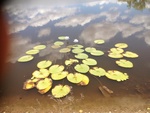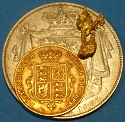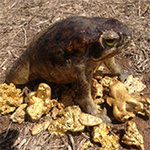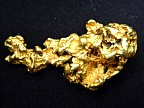Some Australian Crystalline Gold
+3
Kon61gold
Digginerup
GoldnQuartz
7 posters
Page 1 of 1
 Some Australian Crystalline Gold
Some Australian Crystalline Gold
Here's a very unusual gold specimen. I think it was originally a hoppered or skeletal gold crystal, and was found in mud on a salt lake a long time back by a prospecting buddy of mine.
I bought it many years ago, its such a nice piece.
I bought it many years ago, its such a nice piece.
GoldnQuartz- Contributor

- Number of posts : 46
Registration date : 2016-04-07
 Re: Some Australian Crystalline Gold
Re: Some Australian Crystalline Gold
GoldnQuartz wrote:Here's a very unusual gold specimen. I think it was originally a hoppered or skeletal gold crystal, and was found in mud on a salt lake a long time back by a prospecting buddy of mine.
I bought it many years ago, its such a nice piece.
It's invisible mate.
Guest- Guest
 Re: Some Australian Crystalline Gold
Re: Some Australian Crystalline Gold
Wow that is some of the finest crystal gold Ive ever seen  or I should have gone to Specsavers
or I should have gone to Specsavers  all gold pics are most welcome here, have another crack GQ.
all gold pics are most welcome here, have another crack GQ.
Wayne.
 all gold pics are most welcome here, have another crack GQ.
all gold pics are most welcome here, have another crack GQ.Wayne.

Digginerup- Contributor Plus

- Number of posts : 2399
Registration date : 2012-05-17
 Re: Some Australian Crystalline Gold
Re: Some Australian Crystalline Gold
Patience fellas. I'm sure if GQ could put up a picture of the specimen in question, he would have done so. There might be a problem in downloading/posting the picture.
Cheers Kon.
Cheers Kon.

 Re: Some Australian Crystalline Gold
Re: Some Australian Crystalline Gold



Nugget is just over an ounce, at 31.6 g. Still retains the brown hue of the fine clay from the salt lake. Too many nuggets or crystalline and quartz-gold specimens are over-cleaned, or acid-etched and stripped of much of the colour that enhances there character. That can never be returned. This has been cleaned only in water.
The ope was clearly a nice octahedra at some point. whether through growth in a hyper-saline environment of the clay pans, or through etching in that environment, this product is one of the most unique nuggets I've ever seen.
Last edited by Kon61gold on Sat Sep 02, 2017 6:06 pm; edited 2 times in total (Reason for editing : Upload of photos)
GoldnQuartz- Contributor

- Number of posts : 46
Registration date : 2016-04-07
 Re: Some Australian Crystalline Gold
Re: Some Australian Crystalline Gold
A few typos in the last post. Always seem to pick them up after I post. Thanks Kon, for the heads up in how to get the photos uploaded. The caption should read:
Nugget is just over an ounce, at 31.6 g. Still retains the brown hue of the fine clay from the salt lake. Too many nuggets or crystalline and quartz-gold specimens are over-cleaned, or acid-etched and stripped of much of the colour that enhances their character. That can never be returned. This has been cleaned only in water.
The top was clearly a nice octahedra at some point. Whether through growth in a hypersaline environment of the clay pans, or through etching in that environment, this product is one of the most unique nuggets I've ever seen.
Nugget is just over an ounce, at 31.6 g. Still retains the brown hue of the fine clay from the salt lake. Too many nuggets or crystalline and quartz-gold specimens are over-cleaned, or acid-etched and stripped of much of the colour that enhances their character. That can never be returned. This has been cleaned only in water.
The top was clearly a nice octahedra at some point. Whether through growth in a hypersaline environment of the clay pans, or through etching in that environment, this product is one of the most unique nuggets I've ever seen.
GoldnQuartz- Contributor

- Number of posts : 46
Registration date : 2016-04-07
 Re: Some Australian Crystalline Gold
Re: Some Australian Crystalline Gold

Cheers Kon.

 Re: Some Australian Crystalline Gold
Re: Some Australian Crystalline Gold
Simply "wow!"
Great photos. Lovely gold.
I'd heard about salt gold being pretty good to look at. Feel free to post more!
Great photos. Lovely gold.
I'd heard about salt gold being pretty good to look at. Feel free to post more!

Detectist- Contributor Plus

- Number of posts : 375
Registration date : 2010-02-27
 Re: Some Australian Crystalline Gold
Re: Some Australian Crystalline Gold
Oh WOW!!! that's a bloody beautiful piece 
Thank you for sharing and persisting to try and get your pics up on here..
We started a members only thread.. If you would like to place your pictures in there as well.
I would love you too. Please..
https://golddetecting.forumotion.net/t24844-members-gold-album-lets-get-this-topic-going-again-please
Also all other members please..
 Can you imagine all the gold that has been found
Can you imagine all the gold that has been found

Thank you for sharing and persisting to try and get your pics up on here..
We started a members only thread.. If you would like to place your pictures in there as well.
I would love you too. Please..
https://golddetecting.forumotion.net/t24844-members-gold-album-lets-get-this-topic-going-again-please
Also all other members please..
 Can you imagine all the gold that has been found
Can you imagine all the gold that has been found
Guest- Guest
 Re: Some Australian Crystalline Gold
Re: Some Australian Crystalline Gold
 Wow that is a very nice Crystalline nugget there GoldnQuartz.
Wow that is a very nice Crystalline nugget there GoldnQuartz.  Thanks for Sharing your story and photos.
Thanks for Sharing your story and photos. 
Cheers.
Mike.
Guest- Guest
 Re: Some Australian Crystalline Gold
Re: Some Australian Crystalline Gold
Very nice GnQ, glad you got the picture posted up it's well worth looking at 
cheers dave
cheers dave
Guest- Guest
 Re: Some Australian Crystalline Gold
Re: Some Australian Crystalline Gold
That's a great looking piece of salt lake gold but I cannot see it as being crystalline gold?
It looks more like this gold nugget had quartz in it that eroded over time from the salts.
It looks more like this gold nugget had quartz in it that eroded over time from the salts.
Guest- Guest
 Re: Some Australian Crystalline Gold
Re: Some Australian Crystalline Gold
Hi UncleBob. Tryiong to put a few other pics on xtln gold formation, but having a little trouble at the moment saving it as a .jpg, but will post soon as I can.
Cheers
Cheers
GoldnQuartz- Contributor

- Number of posts : 46
Registration date : 2016-04-07
 Re: Some Australian Crystalline Gold
Re: Some Australian Crystalline Gold
Spectacular piece of gold......

California- Seasoned Contributor

- Number of posts : 153
Registration date : 2016-05-08
 Re: Some Australian Crystalline Gold
Re: Some Australian Crystalline Gold
Geez, very nice character nuggy. I hope you get more like that from the area. Thanks for letting us look. TG
Travelergold- Contributor Plus

- Number of posts : 230
Registration date : 2017-04-24
 Re: Some Australian Crystalline Gold
Re: Some Australian Crystalline Gold
Here's some follow up, particularly in regards to UncleBob's questions about the crystalline nature.
Certainly gold found on salt lakes has a very different character from gold found off the lakes in the desert and scrub. Typically the gold accumulates right on the bed of the lake at the base of the lake clays, right on top of the weathered sap-rock - rotten rock. Over long periods of time, it may even grow to some extent (?) or is certainly etched, when it sits on the beds of salt lakes in that super-saline environment. There can be dissolution and re-precipitation of gold, and this is most likely to occur on the bottoms of the salt lake, where there is a lot of decaying organic matter - tell tale signs of that are smelly real crappy stagnant mud. There is no oxygen (the rotting organic matter consumes any available oxygen), it becomes very reducing and when it is disturbed, like trudging through really soft stuff, or digging holes into the mud, gives off the rotten egg and other stench of foul water. But not all lakes are like that, and different areas of the same lakes can be very different too - it depends how much organics etc make it into the lake and down into the mud, how deep it is, how stagnant it is, how much rain there has been, long droughts, etc.
Back to the gold though, gold is cubic, but is rarely seen crystallising as perfect cubes. For some reason it doesn't like to form as perfect cubes, but it occurs as modified cubes of which octahedrons (two four-sided pyramids stuck together on the base) are quite common. And then there are other forms that occur in between. See the diagrams below which shows some steps in the growth of various forms of gold crystals.
The top two photos are some closer shots of what I believe are etched octahedral gold crystals on the nugget I showed earlier. You may not agree, that's fine too, but it’s turned out to be is particularly hard to photograph this aspect! However when you hold this piece and look from various angles you can clearly see the shape of the octahedra.

In the second image, there are two sets of diagrams, the first series is the cubic to octrahedral from, and on the left I've taken a few examples just from searching the internet that illustrate those forms, the top is from Russia, the second down is from Brazil.
The second set of images show some slightly different, buy very common crystal forms as well, but that crystallise in different planes. The photos below the diagrams (again, a few that compare with the images), are gold crystals from Venezuela that most directly compare with the form (j). What is also quite apparent in these crystals is the repetition of hollow grooves, almost like some sort of fish-bone structure. The term for this is 'skeletal' or 'hoppered' and this is part of the way they grow in the crystallisation process. The top 2 octahedra (right hand side) are deeply hoppered, which refers to the way the edges appear to grow out faster than the centres, producing hollow faces. The colourful bismuth growths often for sale in markets etc, are grown in labs and are probably the best examples of extreme hopper crystal development you can find. Where the development of prominent raised edges is less pronounced, but where the stacked hollows are present; that's more typically skeletal growths.
The overall geometry of the third photo from the left along bottom (a venezuelan/brazilian crystalline gold) is composed of several crystals with forms approaching that of image (l), and shows very well developed skeletal growth.

In comparing these features to the nugget, I've taken two further photos. One shows the same deep parallel slots, which are most likely remnants of earlier defined skeletal growth form, and in the last image, a triangular face, of one of the main octahedra which again reserves elements of either early hoppering or skeletal growth.
Whether these slots are from quartz that has been removed during weathering is unlikely, because quartz has its own crystal form too, and is hexagonal. If these were quartz, then the regular nature of the features suggests it was well-crystallised quartz, but it does not have the right shape; Perhaps it was some other mineral but as much as I've tried to work through different mineralsthat it could be - quartz, calcite/carbonates, barite/gypsum (sulfates), I am still not convinced. The etching process has also rounded out some of these features, but that is also a trade mark of the salt lake gold.
Cheers, GnQ
Certainly gold found on salt lakes has a very different character from gold found off the lakes in the desert and scrub. Typically the gold accumulates right on the bed of the lake at the base of the lake clays, right on top of the weathered sap-rock - rotten rock. Over long periods of time, it may even grow to some extent (?) or is certainly etched, when it sits on the beds of salt lakes in that super-saline environment. There can be dissolution and re-precipitation of gold, and this is most likely to occur on the bottoms of the salt lake, where there is a lot of decaying organic matter - tell tale signs of that are smelly real crappy stagnant mud. There is no oxygen (the rotting organic matter consumes any available oxygen), it becomes very reducing and when it is disturbed, like trudging through really soft stuff, or digging holes into the mud, gives off the rotten egg and other stench of foul water. But not all lakes are like that, and different areas of the same lakes can be very different too - it depends how much organics etc make it into the lake and down into the mud, how deep it is, how stagnant it is, how much rain there has been, long droughts, etc.
Back to the gold though, gold is cubic, but is rarely seen crystallising as perfect cubes. For some reason it doesn't like to form as perfect cubes, but it occurs as modified cubes of which octahedrons (two four-sided pyramids stuck together on the base) are quite common. And then there are other forms that occur in between. See the diagrams below which shows some steps in the growth of various forms of gold crystals.
The top two photos are some closer shots of what I believe are etched octahedral gold crystals on the nugget I showed earlier. You may not agree, that's fine too, but it’s turned out to be is particularly hard to photograph this aspect! However when you hold this piece and look from various angles you can clearly see the shape of the octahedra.

In the second image, there are two sets of diagrams, the first series is the cubic to octrahedral from, and on the left I've taken a few examples just from searching the internet that illustrate those forms, the top is from Russia, the second down is from Brazil.
The second set of images show some slightly different, buy very common crystal forms as well, but that crystallise in different planes. The photos below the diagrams (again, a few that compare with the images), are gold crystals from Venezuela that most directly compare with the form (j). What is also quite apparent in these crystals is the repetition of hollow grooves, almost like some sort of fish-bone structure. The term for this is 'skeletal' or 'hoppered' and this is part of the way they grow in the crystallisation process. The top 2 octahedra (right hand side) are deeply hoppered, which refers to the way the edges appear to grow out faster than the centres, producing hollow faces. The colourful bismuth growths often for sale in markets etc, are grown in labs and are probably the best examples of extreme hopper crystal development you can find. Where the development of prominent raised edges is less pronounced, but where the stacked hollows are present; that's more typically skeletal growths.
The overall geometry of the third photo from the left along bottom (a venezuelan/brazilian crystalline gold) is composed of several crystals with forms approaching that of image (l), and shows very well developed skeletal growth.

In comparing these features to the nugget, I've taken two further photos. One shows the same deep parallel slots, which are most likely remnants of earlier defined skeletal growth form, and in the last image, a triangular face, of one of the main octahedra which again reserves elements of either early hoppering or skeletal growth.
Whether these slots are from quartz that has been removed during weathering is unlikely, because quartz has its own crystal form too, and is hexagonal. If these were quartz, then the regular nature of the features suggests it was well-crystallised quartz, but it does not have the right shape; Perhaps it was some other mineral but as much as I've tried to work through different mineralsthat it could be - quartz, calcite/carbonates, barite/gypsum (sulfates), I am still not convinced. The etching process has also rounded out some of these features, but that is also a trade mark of the salt lake gold.
Cheers, GnQ
GoldnQuartz- Contributor

- Number of posts : 46
Registration date : 2016-04-07
 -some-australian-crystalline-gold
-some-australian-crystalline-gold
Wow, very eye catching nugget mate, have you priced it at all as I have one of a larger weight that has the pronounced crystalline prisms. Cheers Dave.

bloodgold2- Seasoned Contributor

- Number of posts : 160
Registration date : 2017-04-02
 Re: Some Australian Crystalline Gold
Re: Some Australian Crystalline Gold
Fascinating info there about what is crystalline gold and your salt lake gold nugget.
Thanks for sharing.
Thanks for sharing.
Guest- Guest
 Re: Some Australian Crystalline Gold
Re: Some Australian Crystalline Gold
Haven't really priced it, because I bought it to keep because of its unusual nature. I bought it for a premium on gold price, but that was also when gold was a lot less than today, so in fact the gold price today is about 3 times what it was when I bought this in about 2001 or 2002.
Certainly there is a premium on crystalline gold, the sharper the crystals, all the more so, but truly depends on the aesthetics as well and of course, dings. Put your pick into the side of a nice crystal, you might as well sell it for smelting price.
Also, as I mentioned before, many people are too quick to clean nuggets or specimens in acids such as HF. This often reduces the value of such pieces, so its worth 'studying' such pieces for some time before jumping in and treating them with anything too harsh.
Cheers.
Certainly there is a premium on crystalline gold, the sharper the crystals, all the more so, but truly depends on the aesthetics as well and of course, dings. Put your pick into the side of a nice crystal, you might as well sell it for smelting price.
Also, as I mentioned before, many people are too quick to clean nuggets or specimens in acids such as HF. This often reduces the value of such pieces, so its worth 'studying' such pieces for some time before jumping in and treating them with anything too harsh.
Cheers.
Last edited by GoldnQuartz on Wed Sep 06, 2017 9:50 am; edited 1 time in total (Reason for editing : typos!)
GoldnQuartz- Contributor

- Number of posts : 46
Registration date : 2016-04-07
 Similar topics
Similar topics» Ugly bit of crystalline gold specimen
» Some Australian Gold Nuggets
» Ho! for an Australian gold field.
» Map of the West Australian gold fields 1
» Australian gold diggings 1855
» Some Australian Gold Nuggets
» Ho! for an Australian gold field.
» Map of the West Australian gold fields 1
» Australian gold diggings 1855
Page 1 of 1
Permissions in this forum:
You cannot reply to topics in this forum